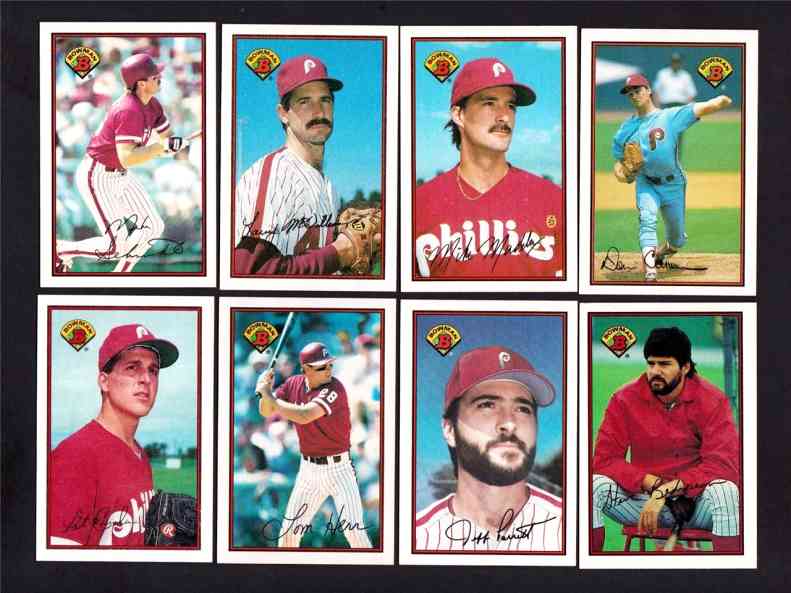Below are short bits & pieces on sportscard & baseball trading card collecting.
Please wander around the website for more info, prices, values & images
on vintage baseball, football, basketball, hockey, sport and non-sports cards.

1953 Topps Baseball Cards
Checklist & Values
The 1953 Topps set is a collection of gorgeous portraits drawn by the
leading sports artists of the day. Key cards in the 1953 Topps set
include: Jackie Robinson, Mickey Mantle, Willie Mays & Satchel Paige.
Satchel Paige had his name spelled incorrectly (2 'L') on the card front.
As with all Topps sets from the 1950's & 1960's, 1953 Topps was issued in
series, (#1-85, #86-165, #166-220 & #221-280) with the final series
"High Numbers" the least produced, least available and thus the most costly.
Topps and Bowman still at war likely accounts for the 6 missing #'s
from the High Number series.
Note: You may be on that page right now.
|

1933 Goudey Baseball Cards
Checklist & Values
1933 Goudey baseball cards were issued during the worst part of
The Great Depression. The set ended up at 240 cards (239 printed
in 1933 and one in 1934). In an effort to attract collectors,
several of the games top players were honored with multiple cards
including "The Great Bambino" who appeared on 4 different cards.
The Babe was once asked why he made more than the President of the
United States, the Babe answered simply: "I had a better year than he did."
The Elusive Nap Lajoie
One of the most important facts regarding the 1933 Goudey set was their
infamous marketing ploy. Goudey took "marketing" to a whole new level
to keep people buying packs by never issuing card #106. Collectors wrote
the Goudey Card Company complaining. They were rewarded with Goudey
sending them the un-issued card #106 (Nap Lajoie) in 1934.
Note: You may be on that page right now.
|

Auction's most costly vintage baseball cards




The history of vintage baseball card auctions is long and colorful.
T-206 Honus Wagner tobacco cards have sold for upto $2.8 million in
auction. The "Holy Grail of Sports Cards", it's extreme-high auction
value can mostly be attributed to great PR and "auction fever".
It's not close to being the rarest baseball card and Honus Wagner is not
Babe Ruth or Mickey Mantle. Yes, the T-206 set is beautiful & special but
because of the # of cards and scarcities, few collector's try to complete,
which should keep auction competition down compared to say 1933 Goudey
or 1952 Topps baseball card issues.
BUT IT DOES NOT...
There's a story Wagner banned his card because he was anti-tobacco
but there are other stories about financial considerations.
You surely have heard of PSA and may even know that this card was the
FIRST they ever graded. But did you know that dealer (B.l. .ast.o name
encoded) admitted tampering with the card, perhaps having it trimmed
down to size, before PSA graded it so highly for the auction.
|

History Of O-Pee-Chee
O-Pee-Chee (OPC) based in Ontario Canada, is mostly thought of as the
Canadian version of Topps but it actually pre-dates Topps by many years.
In 1933, OPC issued their first sports card set, the V304 Hockey cards and
is currently in the tens of thousands. Their first baseball set was
issued in 1937. It was similar to the 1934 Goudeys and Batter-Ups
and the top player was Joe Dimaggio.
O-Pee-Chee created baseball card sets similar to TOpps from 1965 into the
1990's. At first OPC sets were much smaller than Topps
and included just the first few series. Fronts & backs were nearly identical
but with a small "Printed in Canada" on the back and the card stock was
slightly different.
Baseball being much less popular in Canada, OPC print runs of their early
years were between 1% and 10% of Topps making them exceedingly scarce !!!
Starting in 1970, Canadian legislation demanded all items produced in Canada
carry both French & English so OPC baseball cards became bilingual with both
languages included.
Other OPC differences include:
1971, OPC even changed the back design to a much more
interesting back and also offered 14 different card photos not in the Topps set.
1972 OPC included a card of Gil Hodges mentioning his death that was
not a part of the Topps set.
1974 OPC did not include any "Washington Nationals" variations.
1977 the card format remained like Topps but almost 1/3 of the OPC set had
different poses/images than Topps.
In late 1970's, OPC card fronts appeared similar to Topps but sometimes
included traded information saying "Now with XXXX". They were able to do
this as the OPC cards were printed much later into the season.
© 1995-2019 "InterNet's Baseball Card Store" / Joseph Juhasz ... All Rights Reserved
|








